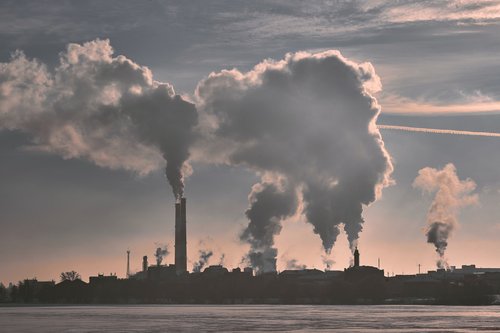Global Warming – Is The Ship Turning?
Wednesday, 27 October 2021By Patricia Lustig and Gill Ringland

As COP26[1] approaches, we are wondering if there are any signs that the juggernaut of global warming may be turning. Will organisations, governments and people decide to act? Will these efforts be enough to halt the warming trend?
Scientists have been tracking global warming and warning of potential consequences since 1988[2]. The scientific framework for understanding the cause of global warming is the subject of John Houghton’s Global Warming[3]. A significant contributor is emission of pollutants (including greenhouse gases or GHGs) into the atmosphere. Initiatives to reduce global warming focus on reducing emissions of CO2 and methane (CH4) and developing carbon capture methods.
Generation Z and Millennials such as Greta Thunberg[4] have been highlighting the issue of global warming more recently. Sarah Jaquette Ray, Professor of Environmental Studies, describes how Generation Z are approaching global warming[5]. “Generation Z students care a lot more about humans than previous generations. They flock to environmental studies out of an awareness that humanity and nature are deeply interconnected and a genuine love for both. These students are increasingly first-generation Americans, non-white and motivated to solve their communities’ problems by addressing the unequal distribution of environmental costs and benefits.” She adds that the rapid and radical changes that society has undertaken in response to the Covid-19 pandemic is evidence that change is possible.
Some Investment funds have claimed to be focusing on 'green' industries, while the ESG descriptor is being viewed critically[6]. Until recently, however, it is probably fair to say, there has been more talk than action.
Now people, governments and organisations have started to ask what will it cost to contain and reverse global warming, to turn the ship? A friend who sold computer systems told us that once a prospect asked the price, she knew she had a customer. We think this is a similar signal, a sign of plans for action on carbon emissions.

One question is whether reducing economic activity alone could turn the ship. The evidence from the Covid-19 pandemic, which curtailed economic activity across the planet, was that it reduced the CO2 emissions from travel and the industrial use of fossil fuels. About 8% of the projected total for 2020 will never be emitted into the atmosphere, according to estimates by the International Energy Agency[7]. However, according to Carlo Buontempo, director of Europe’s Copernicus Climate Change Service[8], “Because of the inertia in the climate system, even if we were to significantly reduce or stop our emissions today, you would still see the expected increase in temperature for the next 20 years to be almost unaffected. In reality it is very likely that the total concentration of CO2 in the atmosphere will continue going up in the future.”
Bill Gates’ book How To Avoid A Climate Disaster: The Solutions We Have And The Breakthroughs We Need[9] highlights that between us, we humans generate 51 billion tons of CO2 each year. So to halt (without even reversing) the incremental global warming effect of CO2 emissions each year, the planet’s economy needs to remove 51 billion tons of CO2 each year. About three quarters of this comes from industry, electricity generation and agriculture. The rest comes from transport and from the heating and cooling of buildings.
Breakthrough Energy, Gates’ climate fund[10], has laid out four different uses for his planned $1.5 billion investment: developing green hydrogen fuels, sustainable aviation fuels, energy storage, and technologies that take carbon dioxide out of the air.
The concept of a 'green premium' can be used to estimate the costs of de-carbonising each sector. This premium is lowest for heating and cooling of buildings, which means that design of new build and insulation of older buildings are obvious targets. Similarly, the design of electric or hydrogen powered passenger cars, buses and trucks is relatively easy. And in New Shoots[11] we provide snapshots of companies piloting systems to reduce carbon emissions in 'wicked' sectors like steel manufacturing and agriculture.

The Earthshot Prizes announced recently[12] included one directly addressing climate change. It went to a German company, Enapter[13]. They have already delivered their scalable plug & play AEM electrolyser modules - which turn renewable electricity and water into green hydrogen - to 33 countries. Other finalists were Reeddi Capsules, from Nigeria, making solar-powered energy capsules to make electricity affordable and accessible in energy-poor communities, and SOLbazaar, Bangladesh, who have the world’s first peer-to-peer energy exchange network in a country on the front-line of climate change. The prizes were specifically to support scaling up of proven technologies.
We think that these new shoots suggest that the ship is turning. The new visibility of the attitude of Generation Z, the focus on “what will it cost”, massive investment in four key technologies, discussion of easy and wicked sectors using 'green premia', and prizes to aid in scaling up – two years ago we did not see any of these. Today we are more optimistic.
References
[1] HOME - UN Climate Change Conference (COP26) at the SEC – Glasgow 2021 (ukcop26.org)
[2] https://www.ipcc.ch/about/history/
[3] Houghton, John, Global Warming: The Complete Briefing, Paperback, Cambridge University Press, (2015).
[4] https://www.bbc.co.uk/news/world-europe-49918719
[5] https://fortune.com/author/sarah-jaquette-ray/
[6] https://www.longfinance.net/news/pamphleteers/esg-fad-or-value-creator/
[8] https://www.bloomberg.com/graphics/2020-how-coronavirus-impacts-climate-change/
[9] Gates, Bill, How to avoid a climate disaster: the solutions we have and the breakthroughs we need, Allen Lane, (2021).
[10] Bill Gates wants in on Congress’ big climate infrastructure push - The Verge
[12] https://earthshotprize.org/
[13] AEM Electrolyser | Scalable Hydrogen Generator | Enapter